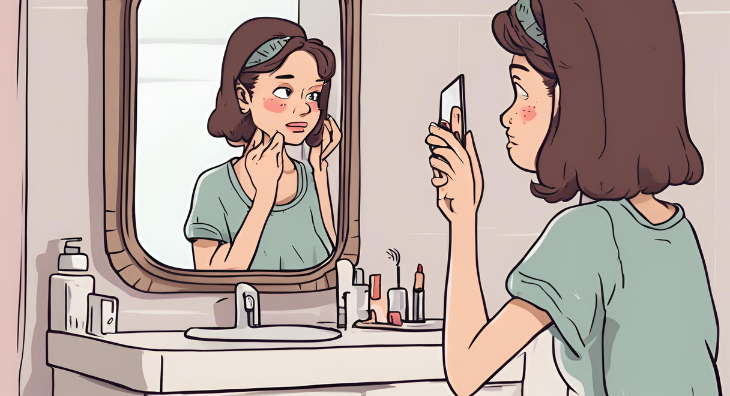Combatting Acne: Stripped Down To The Basics 🍟
Dear all,
In this modern skincare circus, finding the right remedy to acne is trickier than popping a whitehead without leaving a scar. But fear not, today’s debunk is what you need. Prepare to have your mind (and complexion) blown!
__
Today’s Debunk: Combatting Acne: Stripped Down To The Basics 🍟
TL;DR Amidst the abundance of acne-fighting products in the market, it's crucial to take a step back and address the underlying factors that contribute to acne development — oil (sebum), dead skin cells, and bacteria.
Combatting Acne: Stripped Down To The Basics

What causes acne to form?
Three main factors cause acne:
1. Oil (sebum)
2. Dead skin cells
3. Bacteria
Acne occurs when the pores of your skin become blocked with oil, dead skin, or bacteria. When that blockage becomes inflamed, you will see a pimple pop out.
→See Acne symptoms and causes, Mayo Clinic
__
How to target acne?
To effectively target and prevent acne, the approach should be aimed at addressing one or more of the three fundamental factors. If you have noticed, most acne-fighting products on the market work by addressing at least one, if not all three, of these underlying factors that contribute to the formation of acne.
__
Oil (sebum)
Cleansing twice a day is the first step in any skincare routine. Remember that acne is caused by a buildup of oil, dead skin cells, and bacteria on the skin. Cleansing helps remove this excess oil and dirt, reducing the factors that can clog pores and lead to breakouts.
Moisturising is also important, even for oily or acne-prone skin. This may seem counterintuitive, as excess oil production is already an issue. However, it’s possible to have skin that’s simultaneously dry and oily, a condition labelled by dermatologists as “combination skin”. When the skin is dry, the body produces additional oil to compensate, which can then clog pores and lead to breakouts. Moisturising is a crucial step to prevent this cycle and ensure the skin remains properly hydrated.
→See What’s the Ideal Cleanser for Your Skin Type, CeraVe
→See Can You Have Both Dry and Oily Skin at the Same Time, Healthline
→See Moisturizer: Why You May Need It If You Have Acne, American Academy of Dermatology Association
__
Dead skin cells
Exfoliation is the process of removing dead skin cells from the surface of the skin. Normally, the skin naturally sheds these dead cells on its own. However, for people with acne, this natural exfoliation process is not working as effectively as it should, with dead skin cells lingering on the skin longer and clogging up the pores. Regular exfoliation can help reduce acne breakouts by preventing the pores from becoming blocked with a buildup of dead skin cells and sebum (oil).
Retinoids, which are derived from vitamin A, are one of the most effective ingredients for treating acne. They work by helping to regulate the turnover of skin cells, preventing the accumulation of dead skin cells that can clog pores. Retinoids are available both over-the-counter and by prescription from a dermatologist. In fact, Accutane (Isotretinoin), the single most effective drug for treating severe acne, is a type of retinoid medication.
→See Exfoliation Tips to Help Acne-Prone Skin, Verywell Health
→See How to Treat Acne-Prone Skin in Four Simple Steps, Elle
__
Bacteria
You can also use medication with antibacterial properties, such as Benzoyl peroxide. Benzoyl peroxide works against P. acnes, which are the bacteria involved in causing acne.
Similarly, dermatologists often prescribe topical and oral antibiotics to treat acne. Medications like doxycycline and erythromycin can reduce the amount of acne-causing bacteria on the skin, which can lead to less inflammation and clearer skin. However, it's important to carefully follow your dermatologist's instructions as antibiotics can become less effective over time due to the development of antibiotic resistance.
→See Benzoyl peroxide for acne: treatments, uses, and alternatives, Medical News Today
→See How Long Can I Take An Antibiotic To Treat My Acne, American Academy of Dermatology Association
__
Conclusion
Amidst the abundance of acne-fighting products in the market, it can be easy to get overwhelmed. Hopefully, the information provided above offers guidance in developing an effective skincare routine to tackle your acne.
It is not enough to just buy any acne product that claims to reduce breakouts. To effectively manage your acne, it's crucial to address the underlying factors that contribute to its development.
Feedback
At Health Debunks, we want our debunks to be relevant to you! Let us know which health issues you want us to debunk next through feedback@healthdebunks.com